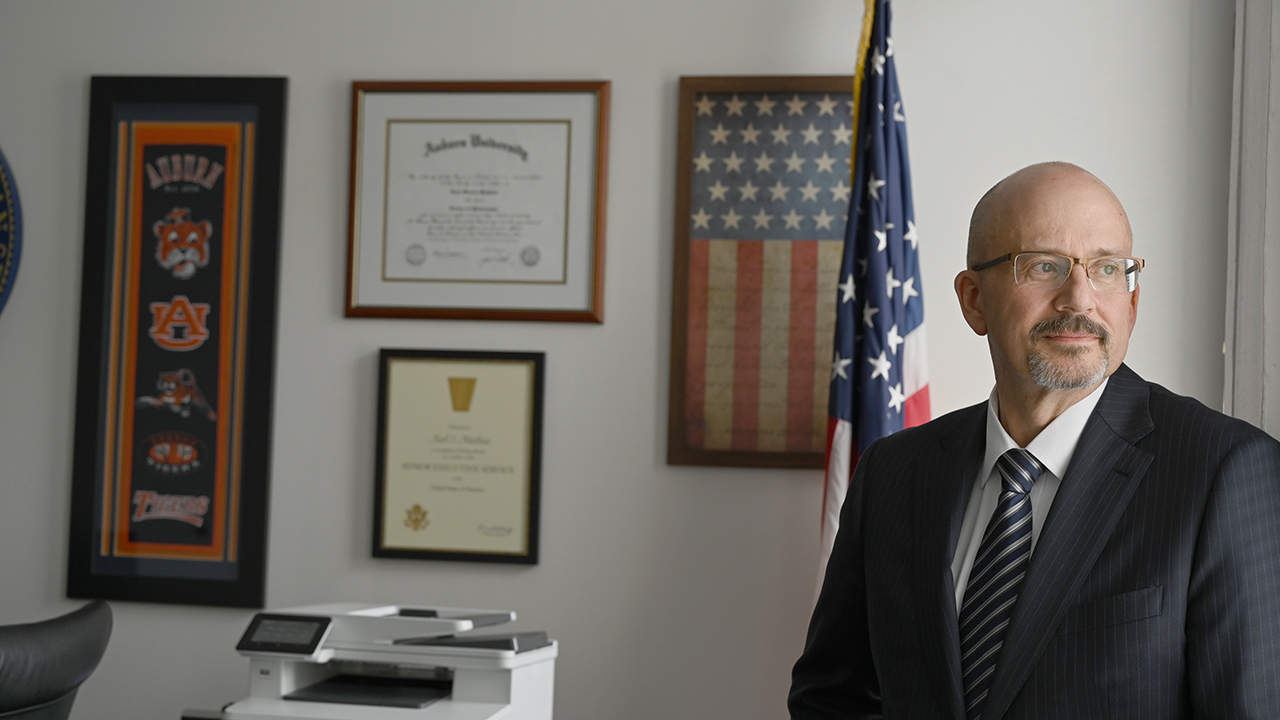CSSE alumnus named CIO at U.S. Dept. of Health and Human Services
Published: Jul 1, 2022 2:07 PM
By Joe McAdory
Saving lives. That’s the mission Karl Mathias, newly appointed CIO at the Department of Health and Human Services, brings to his Washington, D.C., office every day.
“You can trace everything the department does straight back to keeping people healthy, getting sick people well, and saving their lives,” said Mathias, who earned his doctorate from Auburn’s computer science and software engineering program in 1999 – commuting daily from Montgomery while serving at Maxwell Air Force Base. “When I talk to my staff, I remind them not to forget why they’re here. Whether it’s IT governance, fixing computers, or system administration, if systems don’t run well then someone might not get the health care they need. Then guess what happens? We don’t save their life. That’s why I’m here. I love this job and I love our mission.”
As HHS CIO, Mathias provides oversight of the information technology systems and cybersecurity activities for a workforce of more than 83,000, leads the department’s efforts in developing and implementing IT policies, managing high priority projects, and planning strategic IT investments. He also oversees the department’s $7 billion IT portfolio.
HHS is comprised of multiple well-known federal agencies, including the Centers for Disease Control, Centers for Medicare and Medicaid Services, and the Food and Drug Administration, to name a few. “HHS probably touches every single American,” Mathias said.
Comfortable in his previous role at the U.S. Marshals Service, Mathias was responsible for providing IT services and support to 7,600 employees, contractors, and task force officers across 475 locations in the U.S. and eight overseas.
What changed?
“You hear about people struggling,” said Mathias, whose sister worked 20 years as a nurse practitioner and daughter who works as a nurse on a rapid response unit in Columbus, Ohio. “You hear about loved ones who are sick, people with terrible diseases who are in danger of not being able to pay medical bills. These things are just tragic. I thought to myself, ‘I can keep doing what I’m doing at the Marshals Service, which was a great job, or I can do something about it. I decided to do something about it.”
Mathias, a U.S. Air Force veteran, said his management philosophy is simple. He leads by enabling.
“When you’re a department-level CIO and you work for a cabinet-level official, you really need to get into the nuts and bolts of making strategic planning, governance, and oversight machine run properly,” he said. “We have operating divisions like the CDC and FDA and their managers develop the systems that are going to track infectious diseases and monitor the food that’s coming into the country, and so forth. My job is to ensure those projects are viable, are well-managed, and are an effective use of taxpayer funds.
“My philosophy is to enable the operating divisions to do their missions – not get in their way and not overregulate them. Instead, I look to spot potential issues and help head them off. You don’t just point out problems and say, ‘fix it.’ You help get them the resources needed to solve the problems.”
Lessons learned at Auburn — technical, organizational, and fundamental approaches to digging for knowledge — are applied toward decision-making and problem-solving at the federal level.
“Recognizing the difficulty of a problem and understanding the technology and resources required to solve that problem can be traced back to my time at Auburn,” said Mathias, who was attracted to the university in the mid-1990s while stationed in Montgomery after reading a research paper published by former CSSE department chair James Cross. “Some of the things we really get into here at the HHS are data analysis algorithms, data storage technology and retrieval techniques. These were disciplines I learned at Auburn.
“Through its technical preparation, Auburn helps students recognize the complexity of each problem you’re going to face. There’s great value in the technical education. People want to downplay the stuff we’re all required to learn in computer science with data structures and algorithms, but you will use it again.
“Part of the reason I hated to leave Auburn was the university instilled in me a desire to learn how to research, how to analyze problems, how to develop solutions, and how to implement and maintain complex systems. When you take the totality of what I learned in my doctoral program at Auburn, I’m putting it to use every day. I know how to analyze a problem and find a solution. I know where to point people. I know how to organize. This came from Auburn.”
Media Contact: , jem0040@auburn.edu, 334.844.3447
Karl Mathias applies lessons learned at Auburn into his role in Washington, D.C.

